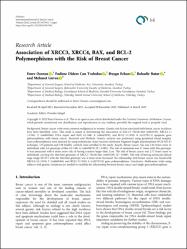| dc.contributor.author | Özoran, Emre | |
| dc.contributor.author | Trabulus, Fadime Didem Can | |
| dc.contributor.author | Erhan, Duygu | |
| dc.contributor.author | Batar, Bahadır | |
| dc.contributor.author | Güven, Mehmet | |
| dc.date.accessioned | 2023-04-20T08:01:20Z | |
| dc.date.available | 2023-04-20T08:01:20Z | |
| dc.date.issued | 2022 | |
| dc.identifier.issn | 2090-3170 | |
| dc.identifier.issn | 2090-3189 | |
| dc.identifier.uri | https://doi.org/10.1155/2022/5817841 | |
| dc.identifier.uri | https://hdl.handle.net/20.500.11776/10877 | |
| dc.description.abstract | Background. Breast cancer is the most common malignancy in women. Genetic risk factors associated with breast cancer incidence have been identified. Aims. This study is aimed at determining the association of XRCC3 Thr241Met (rs861539), XRCC4 G(-1394) T (rs6869366) DNA repair and BAX G(-248) A (rs4645878), and BCL2 C(-938) A (rs2279115) apoptotic gene polymorphisms with breast cancer. Materials and Methods. Genetic analysis was performed using peripheral blood samples. Gene polymorphisms were detected by using polymerase chain reaction-restriction fragment length polymorphism (PCR-RFLP) technique. 175 patients and 158 healthy controls were enrolled in the study. Results. Breast cancer risk was 5.43 times more in individuals with AA genotype of Bax G(-248) A (rs4645878) (P=0.002). The risk of metastasis was 11 times with this genotype. It was associated with 6 times more risk of having a tumor larger than 2 cm. The risk of breast cancer was 2.77 times more in individuals carrying the Met/Met genotype of XRCC3 Thr241Met (rs861539) (P=0.009). The risk of having advanced clinical stage (stage III+IV) with the Met/Met genotype was 4 times more increased. No relationship with breast cancer was found with XRCC4 G(-1394) T (rs6869366) and BCL2 C(-938) A (rs2279115) gene polymorphisms. Conclusion. Multicenter trials using subjects with genetic variations are needed to establish the relationship between breast cancer and single gene polymorphism. | en_US |
| dc.description.sponsorship | surgery residency thesis by Istanbul Training and Research Hospital; Istanbul Education & Research Hospital as part of a residency thesis | en_US |
| dc.description.sponsorship | Acknowledgments This work was supported as part of a surgery residency thesis by Istanbul Training and Research Hospital. This research has been funded by Istanbul Education & Research Hospital as part of a residency thesis. | en_US |
| dc.language.iso | eng | en_US |
| dc.publisher | Hindawi Ltd | en_US |
| dc.identifier.doi | 10.1155/2022/5817841 | |
| dc.rights | info:eu-repo/semantics/openAccess | en_US |
| dc.subject | Single-Nucleotide Polymorphisms | en_US |
| dc.subject | Endothelial Growth-Factor | en_US |
| dc.subject | Squamous-Cell Carcinoma | en_US |
| dc.subject | Repair Genes Xrcc1 | en_US |
| dc.subject | Expression | en_US |
| dc.subject | Susceptibility | en_US |
| dc.subject | Protein | en_US |
| dc.subject | Family | en_US |
| dc.subject | Impact | en_US |
| dc.title | Association of XRCC3, XRCC4, BAX, and BCL-2 Polymorphisms with the Risk of Breast Cancer | en_US |
| dc.type | article | en_US |
| dc.relation.ispartof | International Journal of Breast Cancer | en_US |
| dc.department | Fakülteler, Tıp Fakültesi, Temel Tıp Bilimleri Bölümü, Tıbbi Biyoloji Ana Bilim Dalı | en_US |
| dc.authorid | Can Trabulus, Didem/0000-0003-1687-715X | |
| dc.authorid | GUVEN, MEHMET/0000-0002-8749-1708 | |
| dc.authorid | Ozoran, Emre/0000-0002-9371-6811 | |
| dc.identifier.volume | 2022 | en_US |
| dc.institutionauthor | Batar, Bahadır | |
| dc.relation.publicationcategory | Makale - Uluslararası Hakemli Dergi - Kurum Öğretim Elemanı | en_US |
| dc.authorwosid | Ozoran, Emre/AAM-5091-2020 | |
| dc.identifier.wos | WOS:000783666400001 | en_US |
| dc.identifier.scopus | 2-s2.0-85127477446 | en_US |
| dc.identifier.pmid | 35320970 | en_US |



















